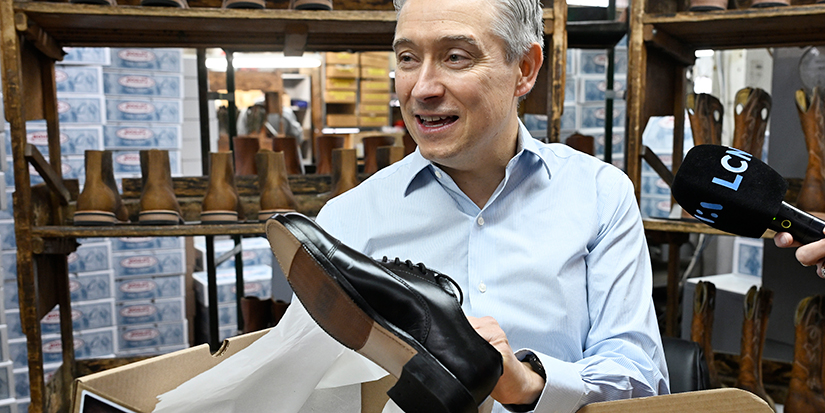Latest News
Help for hush-hush problem
Published 11:19 PST, Thu January 18, 2018
Last Updated: 2:12 PDT, Wed May 12, 2021
It’s big business in Canada and the main
reason for placing an elder in a care facility.
But no one wants to talk about, much less
deal with it.
That’s the bad news.
The good news is there is much that can be
done about incontinence and associated problems on the road to good bladder
health.
“What we don’t want is that your bladder
starts to dictate your life because it can be very isolating for people,” says
Corey Knott, the nurse continence advisor (NCA) and the clinical resource nurse
for the Department of Urology at Richmond Hospital where she helps people with
a variety of challenges.
“We treat symptoms like stress incontinence.
That’s when you laugh, cough, or sneeze, you leak urine. We also look at
urgency and urge incontinence. You have to go suddenly or else you have an
accident.”
Surgery can be an option but Knott, an RN
with post-graduate training as a continence advisor, has tricks up her sleeve
to teach people, men and women, so they sometimes avoid surgery all together.
“We can advise on how to conservatively
manage those symptoms. If we can’t, we’ll send them back to the urologist,”
Knott says.
Knott describes others the clinic helps.
“People who have difficulty initiating urine,
who can’t go. Sometimes it can be prostate related for men. For some people who
have voiding dysfunction, the muscles are too engaged. We make sure they have
been seen by the urologist first. It can be physically worse for you than
leaking. It’s hard on the kidneys,” she says.
She offers options: “For the conservative
management, I do teaching or, if they have been advised by their urologist, I
teach them how to intermittently put in a catheter.”
People’s anxiety will also impact their
bladder, according to Knott.
“This is what we’re seeing a lot of in
children. Having difficulty urinating often has to do with anxiety.”
So, what can be done if you are leaking or
coming close to having accidents?
“They can do pelvic floor muscle
strengthening, also known as Kegel exercises. They are not just for women. They
can also be used for men. They are good not only for stress incontinence, but
also for urinary urgency—for urge suppression.
“When you are rushing off to bathroom and
just can’t make it, there are techniques to suppress the urge to go,” Knott
says.
For Kegels, Knott says, you need to do a
committed three times a day for a minimum of three months to have any benefit.
Kegels strengthen the sling of muscles that hold up the pelvic organs.
“Most people do them incorrectly. It’s a
definite commitment to get the pelvic floor (stronger),” she says.
According to a manager at a gynecologist’s
office, two thirds of the women scheduled to have their significant incontinence
or prolapse corrected surgically called to cancel their surgery when they had
strengthened their pelvic floor muscles enough with Kegels.
Prolapse is when the bladder, uterus, vagina
or rectum are looping down, out of their proper place.
A lower back ache that gets worse with
standing and better through lying flat with your lower legs up on pillows, is a
common indicator of prolapse.
“Heaviness, heavy sort of feeling vaginally
or a feeling like things are falling out, or you can physically feel things falling
out,” Knott says are other symptoms.
Knott says prolapse, which often causes
bladder or bowel problems, needs to be assessed by the urologist first who will
then refer the patient to see her.
“(Prolapse) needs to be addressed. It’s not
going to get better as time goes on. It is progressive, so get it fixed when
you’re younger, because you may not be a surgical candidate when you’re 85,”
she says.
While prolapse and incontinence can be
addressed at any age, they
become problematic in the very elderly. “The
number one reason to place a family member in a facility is due to urinary or
bowl incontinence. People can take a lot but as soon as they start losing
control of their bowel or bladder, it’s very limiting,” Knott says.
In addition to doing Kegels, some women may
benefit from a pessary.
“It’s a round plastic ring inserted into the
vagina that can push up a prolapse,” says Knott. Either a pelvic floor
physiotherapist, or two of the Richmond urologists, can find the right pessary
that will work for each patient. It often helps with incontinence of bladder
and sometimes of bowel.
Whether it’s to learn proper Kegel technique
or to also have a pessary fitted, time with the pelvic floor physiotherapist is
covered by some private insurance but not under MSP.
But, says Knott, “If you are leaking and
paying for pads and laundry—it’s a good investment, because you can minimize or
get rid of pads completely.”
Pads are expensive over time.
“Incontinence is a $1.5 billion industry in
Canada,” says Knott.
There are pelvic floor physiotherapists who
help patients do their Kegel exercises properly. A patient’s time with Knott is
covered by MSP, the time spent learning proper Kegels at a physiotherapist’s is
not. Knott warns that you should never do Kegels while urinating because
stopping the flow of urine can lead to problems as the bladder may not empty
properly.
She also points out that if other techniques
don’t work well enough, there is medication for an over active bladder. “And
now we can use Botox for overactive bladder and our urologists do that.”
Botox, a toxin that stops nerve messages
getting through, can calm an overactive muscle.
During her time with each patient, she also
points out the dietary modifications that usually help.
“Coffee, tea and alcohol can increase
leakage,” Knott says. She also suggests people take out a measuring cup to see
how much their typical mug holds.
She describes a young patient who complained
of being quite jittery: “His bladder was not responding well. It turns out he
was having 17 cups of coffee a day.”
She also says diabetics have to watch their
sugar intake because that can affect bladder function.
Knott also looks at behavioural modifications
that may help. For instance, some people postpone urination for too long.
“This is the normal pattern: you go every
three to four hours in a typical day. And once at night is perfectly normal,”
according to Knott.
If you are getting up more than once in the
night, “Is it your bladder waking you or something else?” she asks.
According to Knott, a lot of times it is a
sleep disturbance more than a bladder issue so she sends the client to a sleep
clinic, or their spouse to a sleep clinic. When we wake, for whatever reason,
it’s normal for our bladder to fill and tell us it is time to urinate.
One elderly woman had a variety of
unsuccessful treatments for her frequent trips to the bathroom throughout the
night. Nothing helped. It turns out, her husband had sleep apnea. Every time he
would start breathing again with a loud snore, he would wake his wife; her
bladder would then fill and cause yet another trip to the bathroom.
If you notice you are truly being awakened by
your bladder, Knott offers hope.
“For some people, they just have to cut the
caffeine before bed, just not have any caffeine within three or four hours of
going to bed.” She says even better is to cut the caffeine off by 2 pm.
When it comes to caffeine, “A lot of people
are drinking way too much,” says Knott.
She says eight to 10 cups should be the
absolute maximum. And, she says with a smile, “Measuring cups not Starbucks
mugs.” Knott says in that daily amount of liquid you have to count fluid from
all sources like juice, soup or fruit.
“If you have a bowl of soup at lunch and
supper, and have milk on your cereal for breakfast, you don’t have to drink 10
cups of water on top of all that fluid you’re having,” she explains.
Knott suggests you stop drinking water after
supper and while you should limit fluid after supper, if you are thirsty drink,
but not too much.
Some people with urine leakage try to control
it by not drinking much of anything but that can backfire.
“If your fluid is too restricted, urine then
becomes too concentrated in the bladder and that (irritation) causes frequency,”
Knott says. Fluid restriction can
lead to dehydration which, in the elderly, can make confusion worse.
In addition to the urinary issues, she sees
patients for problems passing stool. Sometimes, the solution is easy. For
instance, Knott says, people can use too much stool softener, like Metamucil.
“That can lead to constipation. Constipation
and bladder issues have a strong correlation,
If your bowels are not going every day, that
can exacerbate (bladder problems),” she says.
Knott says she tries to exhaust all
conservative management options before looking to surgery. Even then, patients
sometimes see Knott before surgery.
“For example men with prostate cancer: the
urologist will send them to me first so when their catheter comes out they have
a really strong pelvic floor. One symptom of having your prostate out is that
you can have incontinence after surgery.”
Just as women can sometimes find a pessary
helps with incontinence, there are devices, Knott says, that can help men with
incontinence as well as an external condom catheter.
When seeking out a nurse continence advisor,
you find hope and often, practical solutions to an embarrassing and all too
common problem.
“People want to sit down. I give them the
time they need to talk to me and it’s much better because you have to listen to
people. I try to give people my very best,” Knott says.
This skilled, personal care takes time.
Sometimes the wait after a urologist’s referral can be long but for many who’ve
been through her clinic, it has been worth the wait.



































